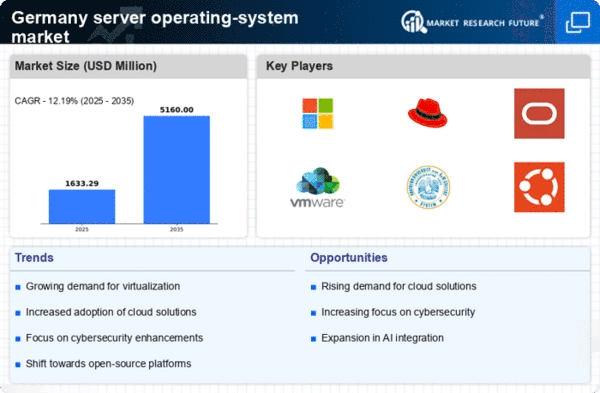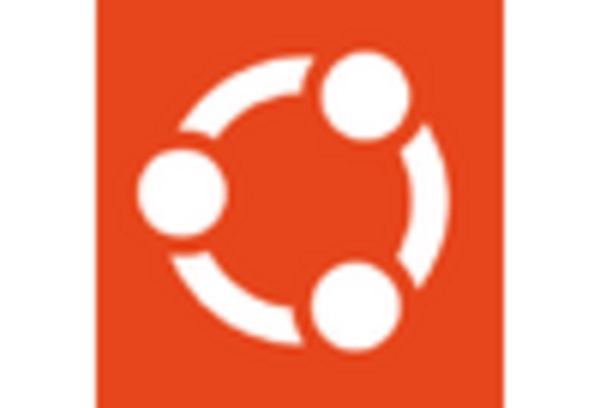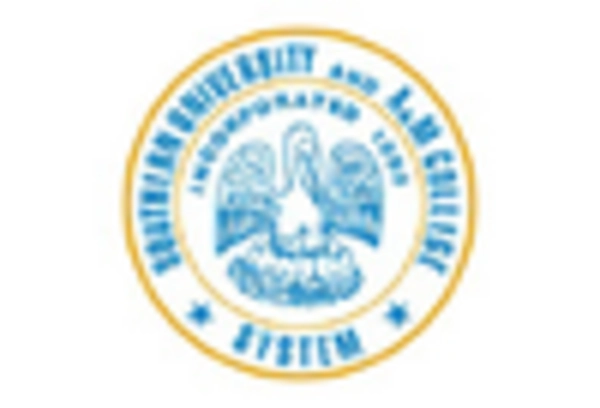Growing Demand for Virtualization
The server operating-system market in Germany experiences a notable increase in demand for virtualization technologies. Organizations are increasingly adopting virtualized environments to optimize resource utilization and reduce operational costs. According to recent data, the virtualization segment is projected to grow at a CAGR of 10% over the next five years. This trend is driven by the need for efficient management of IT resources, enabling businesses to run multiple operating systems on a single physical server. As companies seek to enhance their IT infrastructure, the server operating-system market is likely to benefit from this shift towards virtualization, allowing for improved scalability and flexibility in operations.
Rising Adoption of Cloud Computing
The server operating-system market in Germany is significantly influenced by the rising adoption of cloud computing solutions. As businesses increasingly migrate their operations to the cloud, the demand for compatible server operating systems is expected to surge. Recent statistics indicate that cloud services in Germany are anticipated to grow by 15% annually, creating a robust market for server operating systems that support cloud environments. This shift not only enhances operational efficiency but also allows organizations to leverage advanced technologies such as big data analytics and machine learning. Consequently, the server operating-system market is poised for growth as it aligns with the evolving needs of cloud-based infrastructures.
Increased Focus on Energy Efficiency
Energy efficiency has become a critical consideration for organizations in Germany, impacting the server operating-system market. With rising energy costs and environmental concerns, businesses are seeking operating systems that optimize power consumption. Recent studies suggest that energy-efficient server operating systems can reduce energy usage by up to 30%, leading to substantial cost savings. This trend is particularly relevant as companies aim to meet sustainability goals and comply with regulatory requirements. As a result, the server operating-system market is expected to shift towards energy-efficient solutions, improving overall sustainability..
Regulatory Compliance and Data Protection
The server operating-system market in Germany is significantly impacted by stringent regulatory compliance and data protection requirements. With the implementation of regulations such as the General Data Protection Regulation (GDPR), organizations are compelled to adopt operating systems that ensure data security and compliance. This has led to an increased demand for server operating systems that offer robust security features and compliance tools. Recent reports indicate that companies are willing to invest up to 20% more in solutions that enhance their compliance posture. As a result, the server operating-system market is likely to see a surge in offerings that prioritize regulatory compliance and data protection, aligning with the evolving legal landscape.
Demand for Enhanced Performance and Scalability
The server operating-system market in Germany is driven by the increasing demand for enhanced performance and scalability. As businesses expand and their data processing needs grow, there is a pressing requirement for operating systems that can handle larger workloads efficiently. Recent market analysis indicates that organizations are investing in high-performance server operating systems to support their growing applications and services. This trend is expected to continue, with a projected growth rate of 12% in the performance-oriented segment of the market. Consequently, the server operating-system market is likely to evolve, focusing on delivering solutions that cater to the performance and scalability needs of modern enterprises.
















